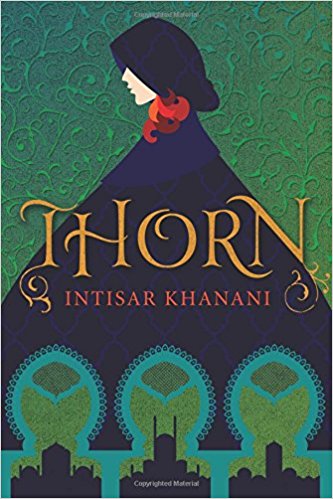Book Review:
Intisar Khanani, 2014
B+
In a fantasy retelling of “The Goose Girl,” Princess Alyrra is sent far from the tiny kingdom she’s known all her life, to marry a prince she’s never met, in a land with a language she doesn’t speak, where royals have a habit of dying or disappearing under mysterious circumstances.
When her traveling companion colludes with a dark witch to steal Alyrra’s face, her name, and her prince, Alyrra discovers she’s relieved to escape the life that was laid out for her and disappear into the stables as Thorn, the goose girl. Accepting the switch for good, however, means keeping silent about the plot against the prince’s life unfolding before her eyes.
The Downside:
There are a few dragging, repetitive lulls, including one sequence in the middle involving Alyrra passing out, being discovered, and waking up being tended to in an unfamiliar place about three times in a row, without it being played for laughs. A few of the transitions are a little difficult to follow, with the dramatic cliffhanger ends of some chapters being left without direct follow up, and the answer to “what happened next?” later being treated as obvious and assumed. The pre-climactic wrinkle where Alyrra is most in danger is more anti-climactic, in that she’s rescued not truly by herself, nor even by the prince, but by the king who is hardly a character for much of the story.
The Upside:
The mood is set beautifully and immediately, welcoming the reader into a world of courtly intrigue and magic spells, without an off-putting crash course of names, places, and rules.
Alyrra is likeable and believable, in spite of the relative passiveness the structure demands of her for much of the story. She’s a girl who’s only beginning to discover and accept her own ability to impact the world around her (and the responsibility that comes with that), and that’s the whole point.
Characters here who resemble each other in ways that would normally herald a repeating motif turn out not to be alike at all, calling out habits of snap judgment, and the connected themes of power, corruption, justice, revenge, and the lines between them are treated with intense weight and nuance.
This is that incredibly rare story in which our hero is allowed to be responsible for the comeuppance of her villains (no convenient falling-off-a-cliff deaths here), and what she does to them is treated neither as proof of her own irrevocable moral decline, nor as a cool, easy, action-hero triumph. It’s ugly, uncomfortable, and perches at the edge of a slippery slope into an endless cycle of violence, yet the alternative of doing nothing is uglier still. And just when it seems Alyrra might retreat back into the apathetic despair of deciding that no sane, decent person would volunteer for the power to change the world, she’s given some of the best advice for any overwhelming problem.
“Start somewhere, then move forward.”
The romance is distant and borderline ominous for much of the story, without offering much to root for, or much emotional urgency for Alyrra to find the courage to save the prince, but it ultimately works nicely after one of the later twists, offering some much needed sweetness and optimism.
I’d go so far as to call Thorn a “gritty fairytale retelling” that does credit to each of those three words.
Agree? Disagree? Comments are always welcome (just keep it civil, folks)! Or keep up with my fictional musings by joining me on Facebook, Pinterest, Twitter, or by signing up for email updates in the panel on the right!







